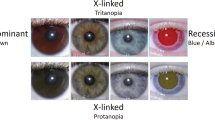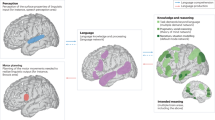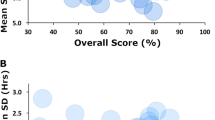Abstract
IT seems likely that the improvements brought about by reading efficiency courses are largely due to such factors as increased concentration rather than the training of eye movements or ‘perceptual skills’1,2. It has been suggested3,4 that increasing one's concentration while reading, or ‘reading more actively’ (a term frequently used by instructors), results in an increasing use of the redundancy of the passage being read, making the immediate stimulus more easy to recognize and process further.
This is a preview of subscription content, access via your institution
Access options
Subscribe to this journal
Receive 51 print issues and online access
$199.00 per year
only $3.90 per issue
Buy this article
- Purchase on Springer Link
- Instant access to full article PDF
Prices may be subject to local taxes which are calculated during checkout
Similar content being viewed by others
References
Perry, W. E., and Whitlock, C. P., Harvard Educ. Rev., 24, 6 (1954).
Morton, J., Occup. Psychol., 33, 222 (1959).
Morton, J., Brit. J. Psychol., 55, 165 (1964).
Morton, J., Quart. J. Exp. Psychol., 16, 340 (1964).
Poulton, E. C., Brit. J. Educ. Psychol., 31, 128 (1961).
Author information
Authors and Affiliations
Rights and permissions
About this article
Cite this article
MORTON, J. A Two-hour Reading Course. Nature 211, 323–324 (1966). https://doi.org/10.1038/211323a0
Issue Date:
DOI: https://doi.org/10.1038/211323a0
This article is cited by
-
Feeding the information eaters: Suggestions for integrating pure and applied research on language comprehension
Instructional Science (1978)
Comments
By submitting a comment you agree to abide by our Terms and Community Guidelines. If you find something abusive or that does not comply with our terms or guidelines please flag it as inappropriate.



